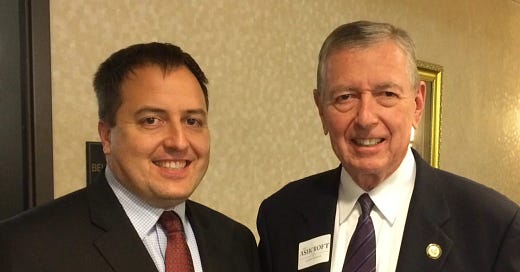The Ashcroft Connection: Biometrics, Privacy, and Power in Missouri
Biometric Big Brother? The Ashcroft Dynasty's Data Gambit in the Show-Me State
Credit: STL PR
Big-Daddy
A concerning situation is developing in Missouri that deserves close attention. It involves the intersection of powerful biometric technology, political connections, and potential conflicts of interest that could have far-reaching implications for privacy and governance in the state.
The Companies and Their Alliance
BI2 Technologies
BI2 Technologies specializes in biometric identification - technology that uses unique physical characteristics like iris patterns or facial features for identification. With over 120 customers across the US, they perform an astounding 12 billion "compare transactions" annually. This represents a substantial amount of biometric data being processed.
The Ashcroft Group
Led by former U.S. Attorney General John Ashcroft and the author of the Patriot Act, The Ashcroft Group is a strategic consulting company focusing on areas like security and data management. They leverage Ashcroft's extensive experience and connections in government and law enforcement.
These two entities have entered into a "strategic alliance and investment agreement." While this might seem like standard business practice, the nature of their work and the individuals involved raise significant concerns.
Privacy Concerns
The scale of BI2's data collection is staggering. They're gathering fingerprints, iris scans, and facial recognition data - not just for law enforcement, but expanding into commercial operations for employee and contractor management. This means the potential for widespread collection and use of personal biometric data. This could happen at your job or if you enter the grounds of a company that has cameras.
As a private company, BI2 isn't subject to the same transparency requirements as government agencies. We have limited insight into how this data is being used, stored, or who has access to it. The involvement of John Ashcroft, who played a key role in the Patriot Act and has connections to the Deep State, adds another layer of concern for privacy advocates.
Political Connections and Potential Conflicts
This is where the situation becomes even more complex. John Ashcroft's son, Jay Ashcroft, is currently Missouri's Secretary of State and is running for Missouri’s governor against Senator Bill Eigel and Lt. Governor Mike Kehoe. If elected, he would be in a position to potentially regulate or influence contracts related to his father's business interests.
Jay Ashcroft's track record on managing conflicts of interest is troubling. He has refused to recuse from certifying the elections—which is a clear conflict of interest and has even taken legal action against those who've questioned the state’s Election Integrity. Moreover, he's made it extremely difficult for at least one legal challenges against him to proceed to trial.
Gubernatorial Concerns: Potential Misuse of Power
Jay Ashcroft's candidacy for governor raises several alarming possibilities:
1. Contract Manipulation: As governor, Jay Ashcroft could potentially steer lucrative state contracts towards BI2 Technologies or other companies associated with The Ashcroft Group. This wouldn't just be a conflict of interest - it could amount to nepotism and misuse of public office for family gain.
2. Surveillance Concerns: With control over state law enforcement and data management policies, Jay Ashcroft could implement widespread use of BI2's technologies across state agencies, effectively creating a powerful surveillance apparatus. This could lead to:
- Tracking of Missouri citizens without proper oversight or consent
- Use of biometric data for political purposes, such as monitoring opposition or activists
- Sharing of citizen data with federal agencies or private entities without adequate safeguards
- Do we trust Jay Ashcroft, or his father’s friends, who seem intent on creating a surveillance state across our nation and in our state?
3. Lack of Accountability: Given Jay Ashcroft's history of resisting recusal and blocking legal challenges, there's a real concern that he would continue this behavior as governor. This could make it extremely difficult to challenge any misuse of these technologies or questionable contracts through normal legal or legislative channels.
Conclusion
What we're facing is a convergence of extensive data collection, powerful political connections, and a resistance to oversight. It's a situation that demands careful scrutiny and raises important questions about privacy, governance, and the use of technology in our society.
The combination of access to powerful surveillance tools and a demonstrated resistance to oversight creates a potentially dangerous situation for civil liberties in Missouri. It's not just about privacy anymore - it's about the fundamental principles of democratic governance and the potential for abuse of power.
As citizens and voters, it's crucial that we stay informed about these issues, ask tough questions, and demand transparency from both private companies and public officials. We need to be asking:
- How would these technologies be used under an Ashcroft administration?
- What safeguards would be in place to protect citizens' privacy?
- How can we ensure proper checks and balances are maintained?
The potential implications for privacy and democratic oversight are too significant to ignore. We need to ensure that advancements in technology and security don't come at the cost of our fundamental rights and freedoms. The integrity of our democratic institutions and the privacy rights of Missourians are at stake.
Research






Going to share this!